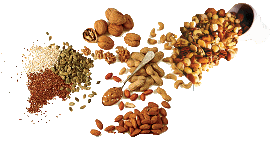| Vegetarian Era |
The Advantages of Plant-based Diet
|
Many people would like to make the switch to a vegetarian diet; however, some people are concerned about not having enough protein and malnourishment. Now, they can have great relief! Scientific studies have proved that plant-based proteins are real high-quality proteins and “Eating a large variety of plant-based foods is one of the best things you can do for your health...,” says Melanie Polk, the nutrition education adviser for the American Institute for Cancer Research.
After many years of study on the associations between diet and disease, Dr. T. Colin Campbell, honorary professor of Nutritional Biochemistry at Cornell University, USA, pointed out that a diet high in animal products produces disease, and a diet high in grains, vegetables and other plant matter produces health. “Nutrients from animal-based foods increased tumor development while nutrients from plant-based foods decreased tumor development.” According to Dr. Campbell, “The vast majority of all cancers, cardiovascular diseases, and other forms of degenerative illnesses can be prevented simply by adopting a plant-based diet.”
Dr. Caldwell B. Esselstyn Jr., a former internationally known surgeon, prescribed the lowest dose of anti-cholesterol medicine and minimal-lipid plant diet for patients with cardiovascular disease. He noticed that those who attended this protocol and adopted a plant-based diet experienced complete relief of angina, and the once-blocked artery reopened again. Dr. Esselstyn convincingly argues that this diet cannot only prevent and stop the progression of heart disease, but also reverses its effects.
High-quality proteins are easily found in beans, nuts and vegetables that provide different benefits for the body. Here is a quick review of some common foods:
Adzuki beans (small red beans): Rich in protein, B vitamins, minerals and fiber. Adzuki beans help improve functions of the kidneys, bladder and reproductive organs. They also have the effect of blood nourishment, diuresis, anti-dropsy and enhance the cardiac function.
Soya beans: Several studies have confirmed that consumption of soy products can reduce low-density lipoprotein (LDL), known as the bad cholesterol, and help strengthen the heart. Dr. James Anderson from Virginia Medical Center stated, “All these studies have consistently found an average 3 to 6 percent reduction in blood cholesterol with 25 grams of soy protein daily. Soy foods are one of the few foods that lower cholesterol.” Women who ate more than 13 grams of soy per day had a 35% lower risk of fracture than those who ate less than 5 grams per day. Soya beans are also natural medicine for menopausal women, they not only provide the effect of estrogen, but also reduce the risk of cancer.
 Black
soya beans: Recent studies published in the Journal of Science, Food and
Agriculture showed results that black soya beans can reduce the risk of
Type II diabetes. The researchers from Hanyan University, Seoul, Korea,
said that eating black soya beans lowers fat and cholesterol levels, a
major contributor to type II diabetes. The test group under study showed
that eating black soya beans significantly reduces low-density lipoprotein
(LDL). Because weight is often a key issue for type II diabetics, black
soya is a good choice of food because it is low in fat, high in soluble
fiber and a good source of protein. Other beans, vegetables and nuts:
One cup of cooked spinach can serve up to 5 grams of protein. Half a cup
of kidney beans provide 7 grams of protein. A handful of almonds offers
up to 6 grams in protein. All these foods also carry many other needed
nutrients, vitamins, minerals, essential oils and enzymes.
Black
soya beans: Recent studies published in the Journal of Science, Food and
Agriculture showed results that black soya beans can reduce the risk of
Type II diabetes. The researchers from Hanyan University, Seoul, Korea,
said that eating black soya beans lowers fat and cholesterol levels, a
major contributor to type II diabetes. The test group under study showed
that eating black soya beans significantly reduces low-density lipoprotein
(LDL). Because weight is often a key issue for type II diabetics, black
soya is a good choice of food because it is low in fat, high in soluble
fiber and a good source of protein. Other beans, vegetables and nuts:
One cup of cooked spinach can serve up to 5 grams of protein. Half a cup
of kidney beans provide 7 grams of protein. A handful of almonds offers
up to 6 grams in protein. All these foods also carry many other needed
nutrients, vitamins, minerals, essential oils and enzymes.
It is recommended to cook a combination
of various accessible beans, brown rice and some other whole grains, and
consume a bowl of this grain-bean mix daily with adequate amounts of vegetables
and fruits. By this, you will have enough nutrition and bid farewell to
many diseases. ![]()
| << | Contents | >> |
|
Refer this page to friends
|
||